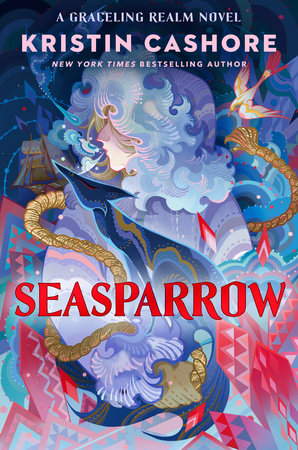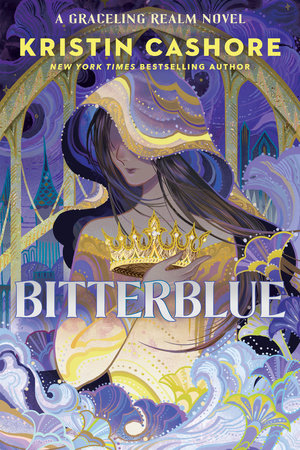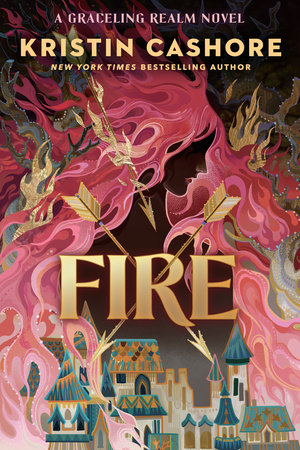
Winterkeep
Part of: Graceling Realm
Paperback
$14.99
- Pages: 528 Pages
- Series: Graceling Realm
- Publisher: Penguin Young Readers Group
- Imprint: Dial Books
- ISBN: 9780147513113
An Excerpt From
Winterkeep
The Keeper
The man with the white streak in his black hair was diving too close to her again. He was a powerful swimmer, for a human. He kept pulling down through the water with strong arms and hands, propelling himself with big kicks.
The sea creature tried to quiet her trembling limbs, so that if the human got deep enough to see her, he would think she was just a mountain of moss on the ocean floor and would turn away and stop scaring her.
Then the human shot back up to the surface. The creature relaxed, relieved that humans needed air. Especially this human, who was different from the others. Most humans jumped out of a boat, thrashed around in the water looking like birds trying not to fall out of the sky, then dragged themselves back into their boats, satisfied. The sea creature never saw them again.
But this human returned frequently, and dove with a purpose that frightened the creature, for she kept treasures here on the ocean floor, gathered them, guarded them, and this human knew about one of them. He didn’t know about her. No one knew about her. But he wanted the object that was her favorite treasure. She could feel him thinking about it. She wound her long tentacles around it, trying to hide it from sight. It was a ship.
This ship, two-masted with swirling sails, had dropped nose-first from the waters above not too long ago, and landed beside her. All the creature’s treasures—nets, harpoons, anchors—sank like this, from the bright water above. But ships were rare treasures, and this ship was extra-special, for when she pressed one of her eyes to a porthole, she could see a secret world inside. A pink room with tiny sofas and armchairs attached to the floor, paintings on the walls, lamps; a skylight crossed with bars and a door with a sparkling knob and hinges; and two pink-skinned human bodies, which were beginning to look soft and puffy. She called it her Storyworld.
The most special and unusual thing about her Storyworld was that there was a padlock on the outside of the door, trapping these bodies inside. Usually, when a ship sank, the people jumped into the water or the lifeboats, trying to live. They didn’t close themselves into a room with a padlock.
The human with the white streak in his black hair, who had brown skin, dove deep again, looking for the ship. He thought about a woman sometimes as he dove, a human woman with dark braids and gray eyes who wore glimmering rings on pale brown fingers. The sea creature understood that he wanted the ship so he could give it to the woman. The sea creature didn’t like this woman, not at all.
The diver’s own boat was a small oval above. She thought about grabbing its anchor and pulling. It was not the sort of thing she ever did. If she pulled his boat under, he would probably see her, and she never attracted anyone’s attention. But then, eventually, he would drown, and that would make him stop looking for her favorite treasure. In fact, he himself would make a fine treasure. In addition to the nice way his hair floated around his face, and in addition to his tiny, perfect muscles, his tiny, perfect hands and feet, a red jewel sparkled on a ring on his thumb. The creature would like to slide that ring from his thumb and wear it at the tip of one of her thirteen tentacles. She loved the sparkly things humans wore. And then the man would bloat, and rupture, and rot, and eventually become a smooth, shiny skeleton in tattered clothing, and she loved that about humans too. She could add him to her collection of bones. Encircle him with her tentacles, keep him safe.
Then a pod of silbercows approached, so she decided to leave the human’s small oval boat alone. Silbercows never let humans drown, if they could help it. Silbercows were about the size of one of the sea creature’s eyes. They made platforms with their backs and lifted drowning humans to the surface, thinking encouraging thoughts at the humans. Also, now the chance of being seen was too great. Silbercows had better underwater vision than humans.
Again, the human broke his dive and ascended to the surface. Next, the human seemed to be playing with the silbercows, swimming and rolling with them, laughing, shouting in happiness. This happened pretty often with this human. The silbercows liked to visit him, and he always laughed a lot.
Then, without warning, something extraordinary happened. Two new humans crashed into the water from above, attached to long ropes. They grabbed the laughing human, struggled with him. He fought, punched, kicked, twisted. He was marvelous; she waited for him to break away. But then he seemed to run out of air, for his body went still. The other two humans shot out of the water on their ropes, lifting his body with them.
The creature was so flabbergasted that she rose some distance from the ocean floor, balancing on her thirteen tentacles and reaching around with her twenty-three eye-stems. Through the wavy glass of the water above her, she could make out the form of an airship heading north across the sky.
Then, remembering the silbercows and not wanting to be discovered, she sank back into the darkness at the ocean floor. They didn’t notice her; their purple-blue faces were stretched above the surface, their big, dark eyes watching the limp man being carried by the airship. Their mental voices were raised in a song of distress. They communicated in pictures and feelings, not words, but the creature understood their meaning. We see you, friend, they were crying. We know. We will tell.
The creature, when she scavenged for treasure, went to dark places, because she didn’t want the silbercows to see her. The silbercows were surface animals, creatures of the light; she was a creature of the depths, a sneaker, a crawler, a dragger. There were animals who saw her in the places where the creature liked to go, pulling herself forward with her long tentacles, but they weren’t the kinds of animals whose attention mattered.
Today she crossed the field of pink and white flowers and slunk into the forest of filaments and reeds, where the seahorses peered out of their swaying caves. Seahorses forgot about things once they could no longer see them. Sometimes, when they saw her, they unwound their tails, shot back into darkness, then forgot and came forward again.
The creature was thinking about the human with the white-streaked hair, the humans who’d grabbed him, and the silbercows who’d called out to him. We see. We know. We will tell.
See what? Know what? Tell whom? The creature didn’t want the answers to these questions. She was relieved to live in the deep, away from the light where animals interacted and interfered with each other.
She reached the place where clumps of moss gathered against the base of coral mountains. The sponges who lived here had tiny, bright, sharp minds full of silly words. Keeper! Friend! Hero! Keeper! Music! Laughter! Dance! Keeper! Keeper!
They sang in a chorus around her every day as she brought moss to her mouth with her tentacles. She was so used to their song that she paid it no attention. Sponges weren’t very smart. Once, when she’d tried to eat one on a sudden, curious whim, it had screamed with laughter as she’d tried to pull it from its pillar, as if she was tickling it. Keeper! it had cried. Games! Jokes! Fun! She’d given up, let it go, and returned to ignoring them.
Usually, after she ate, she scavenged for treasure in the murky pits beyond the coral mountains. Today, though, the creature didn’t need to scavenge, for the same currents that brought her food had brought a treasure. It was a little thing, a ball of metal, bobbing and tapping against the coral. Human-made, but not an object the creature recognized. Egg-shaped, with a tiny circle of metal at one end that was attached to some sort of pin. The circle and the pin were shiny, which was pleasing, though nowhere near as pleasing as the sparkly red jewel on the thumb of that diving human.
The creature picked the thing up and held it to her eyes. She caressed the metal circle, wondering if something happened when you pulled it, for sometimes human-made objects did things, if you touched them in the right place. One of her treasures was a box that opened and closed. Another had a chain wound around a cylinder, and a handle that made the whole thing turn; at the end of the chain was an anchor that thumped and dragged along the ocean floor when she played with it.
She would save pulling the metal circle as a treat for later. She carried the thing home and added it to her treasures.
It was nighttime when the creature woke to an unfamiliar perception. On the moonlit surface far above, the silbercows were crying out in their sleep.
Confused, she stretched her neck and swiveled her eyes. Overhead, lights flashed, thuds sounded, and suddenly, screams of silbercows stabbed at her mind. The screams galvanized her body, sharp and electrifying, the silbercows crying out in heartbreak, desperation, as had never happened before. The creature was so overwhelmed by the pain of the silbercows that she did something she’d never done. Rising to the surface, she lifted her eyes above the water.
Below a blanket of stars, humans in small boats were thrusting spears into silbercows.
The creature ducked below the surface again. What was this? No one ever killed silbercows!Hide, she thought to herself. Hide! Make it go away.
But as she tried to sink back down to her treasures, four silbercows, escaping, zoomed past her. They saw her, suspended in moonlit waters. They stared at her in amazement.
Pretend I’m not here, she begged them, trembling in every limb. Pretend you can’t see me.
Are you the Keeper? they cried, throwing their pain at her, washing against her with their fear. You must be the Keeper! You’re our hero! Save our friends!
The creature didn’t know what they meant. Three of them were bleeding. One had blood pouring from a wound in his shoulder.I’m not called Keeper, she said. I don’t have a name. You’re confusing me with someone else.
Help us! they cried. What’s wrong with you? You’re the hero of Winterkeep! You’re supposed to protect us!
Deciding to pretend she couldn’t hear them, she sank down into the blackness of the ocean floor.
Chapter One
Giddon was carrying a sleeping child through a rocky tunnel when he got his first clue that something was wrong in Winterkeep.
The child’s name was Selie, she was eight, and she was not small. In fact, Giddon was starting to wonder if she was growing while he carried her. Surely she was objectively heavier now than she’d been when she’d held her arms up to him two hours ago, a gesture that hadn’t surprised him, for the children always wanted Giddon to carry them through the tunnels. He was bigger, more interesting, and less anxious than their parents, or so the children thought. Giddon was actually quite anxious during these missions for the Council, these smuggling journeys through the tunnels from Estill to Monsea, but he buried his worries deep, where they couldn’t reach his eyes or his voice. It was more helpful to seem calm and reassuring.
So he carried Selie calmly, with exhausted shoulders and dead arms, wading through streams, trying to measure the fatigue in the drawn, white faces of her family, stepping carefully from rock to crevice to stone on an uneven path lit by the lantern of Selie’s older sister, Ranie, who, at nineteen, kept giving Giddon sly, flirtatious glances. He was used to this too on these missions. He’d gotten in the habit of mentioning his beloved girlfriend frequently in conversation. Giddon didn’t have a girlfriend. It was another thing he pretended, to keep things simpler.
He put up a hand to stop Selie’s head from lolling. Children are bizarrely flexible, thought Giddon. Sometimes it seemed like her head would roll right off her body and plop onto the rocks. And Selie was the reason for this journey through the tunnels to Monsea, for she was a Graceling, Graced with mind reading. In Estill, Gracelings were the property of the new government, which exploited theirspecial abilities however it saw fit. There were all kinds of Graces, ranging from skills as banal as imitating bird calls to more useful capacities such as speed on foot, predicting the weather, fighting, mental manipulation, or mind reading. In Monsea, where Queen Bitterblue made the rules, Gracelings were free.
The Council—which had no other official name, just the Council—was a secret international group of spies, rescuers, fighters, plotters, consultants, headed by Giddon and a few of his friends—Raffin, Bann, Katsa, Po—that came to the aid of anyone anywhere in the Seven Nations suffering unjustly under the rule of law. The Council had started small some fourteen or fifteen years ago—Katsa had started it—but now its reach was vast.
Giddon and his friends had, in fact, assisted the Estillans with the coup of their corrupt king. But then the makeshift republic that had taken the place of Estill’s monarchy had turned out to be more militarized than the Council had anticipated. And the Council never held with governments owning Gracelings.
So here Giddon was, secretly sneaking Gracelings away from the Estillan government he’d helped to establish. Trying to avoid the Estillan soldiers armed with swords and bows who had begun patrolling the Estillan forests recently, asking for the identification of anyone they met.
Giddon’s sword was heavy at his side. He found some strength to hold Selie tighter, in case she was cold. It was early May, and frigid underground. A steady trickle from a hidden ledge above had been plaguing them for the last twenty minutes and Giddon had found it hard to keep the child’s hat and scarf dry. Some two hours from now, the path would change, turn into the steady, downhill slope that would deliver them gently to the forests outside Bitterblue City. And Giddon would bring this family to the Council allies in Monsea who were awaiting them, then return himself to Bitterblue’s court. Fall into bed, sleep for a year. Then go find Bitterblue.
“Did my father remember to give you that message?” Ranie said to Giddon, speaking so quietly that he had to move closer to her, lean in.
“What message?” he said, liking, despite himself, the way voices rumbled through these tunnels, turning into whispers, like the trickling water.
“Papa?” said Ranie, turning back to speak to the balding man who plodded along resolutely behind them, a sleeping baby strapped to his front. Beside him, his wife marched with an expression on her face like she would walk forever, if that’s what it took. It was an exhausted but determined sort of expression that Giddon recognized. He suspected she was walking on blistered feet. Parents did heroic things for their children.
“Papa, didn’t you have a message for Giddon?” said Ranie.
“Oh, yes,” said the man, blinking as if waking, then seeming startled by the volume of his own voice. The tunnels could do that, lull you into a sense of being inside yourself. Conversation could seem like violence.
“It’s a message about those two Monseans whose ship went down in Winterkeep,” said the man. “You know about that ship, theSeashell?”
Giddon suddenly saw Queen Bitterblue at the door to his rooms, clutching a letter, her tear-strewn face upturned to him. Bitterblue’s envoy to Winterkeep, Mikka, and one of her advisers, Brek, had died in that shipwreck on the other side of the world. And it had been an accident—Giddon had assured her over and over, hugging her in his doorway—but still, she’d blamed herself, for she’d been the one who’d sent those men away, to a death so far from home.
“Yes,” Giddon said grimly. “I know about the drowned Monseans.”
“I’m supposed to tell you that they had some news about something called zilfium.”
“News about zilfium?” said Giddon, who found this message rather opaque. Zilfium, to the best of his memory, was a kind of fuel that was important in Winterkeep, but he couldn’t remember why. “What news?”
“I don’t know,” said the man. “I only know that they wanted to tell Queen Bitterblue some news about zilfium, but then they went sailing that day and drowned. So the queen should learn what she can about zilfium.”
“Who told you to tell me this?” said Giddon.
“The man who brought us to the start of the tunnels, where you met us,” he said. “Bann, the one who’s the consort of Prince Raffin of the Middluns. He said he had it from Prince Raffin, who had it from a letter one of the Monseans wrote to him before he drowned.”
Council messages were often passed like this—from mouth to mouth. “Did Bann give you anything for me in writing?”
“No, nothing,” said the man. “Only what I’ve said: that before that ship went down, the Monseans had wanted to tell Queen Bitterblue some news about zilfium, so maybe Queen Bitterblue should look into zilfium.”
This message was intensely annoying, and Giddon didn’t think it was merely because he was wet and exhausted and carrying a child made of lead. One, he didn’t understand it. Two, he suspected some part of it was missing. And three, the reminder of her dead men was probably going to make Bitterblue cry.
Ranie was walking close to him again, and speaking so quietly that he had to bend down to her. He began to wonder if she might be doing this on purpose.
“What’s zilfium, Giddon?” she asked.
A stream of icy water hit the back of his neck. “I’m not sure,” he said crossly.
“She is doing it on purpose,” said Selie sleepily in his ear, making him jump. He’d been sure the child was asleep.
“Doing what?” he said, somehow finding this to be the most aggravating thing yet. Mind readers!
“Ranie’s talking in a low voice so you’ll get close to her,” Selie whispered, too quietly for anyone else to hear. “Also, I know your girlfriend is imaginary.”
“Oh? And do you know you’re as heavy as a horse?”
Selie was giggling. “Don’t worry,” she whispered. “I won’t tell.”
When, hours later, the party emerged from the tunnels into the pink morning light of the Monsean forest, tears began to stream down the face of Selie’s mother. She crouched onto a carpet of rotting leaves, sat, and said, “I just need to rest my feet for a moment, children.”
“Let me take a look,” said Giddon, lowering Selie stiffly to the ground. Selie made a protesting noise, clinging to him. “I need you to walk now, Selie,” he said. “You see the forest? This is Monsea. What do you think?”
The forest here was practically identical to the forest in Estill where they’d entered the tunnels: tall, thick trees with the pale green buds of early summer, dark, scraggy pines. Wind, birdsong, trickling water, squirrels.
But Selie began to cry. “It’s ugly,” she said, and Giddon understood. It was the nature of escape. A person consumed with the need to flee didn’t have the luxury of realizing how far away her home would seem, once she stopped running.
“Come, Selie,” said her mother, holding an arm out to the child. “Come keep me company while Giddon prods at my feet.”
“Your faith in my abilities is touching,” said Giddon. “Let me just go collect some sharp sticks to stab them with.”
Selie, still crying but now also giggling, tucked herself against her mother’s side, where she sniffled, receiving kisses, while Giddon took off her mother’s shoes. When he found her feet so bloody that it would be difficult to remove her socks without pulling her skin away, he chided himself for not checking sooner. Then he considered the distance still to go. The contact Giddon was bringing them to would have clean, fresh water, medicines, a bed for this woman to lie down upon. It wasn’t far, and the others seemed able to walk.
The baby was fussing. The woman reached her free arm out for the infant, then gave him her breast. The father and Ranie hovered nearby, as if wanting to be useful.
It would be best to wait to remove these socks. Thank goodness I’m big, Giddon thought.
When the baby was done feeding, the woman handed him back to her husband. Then Giddon gave her a pill for pain, lifted her into his arms, and carried her the rest of the way.
More in Series











